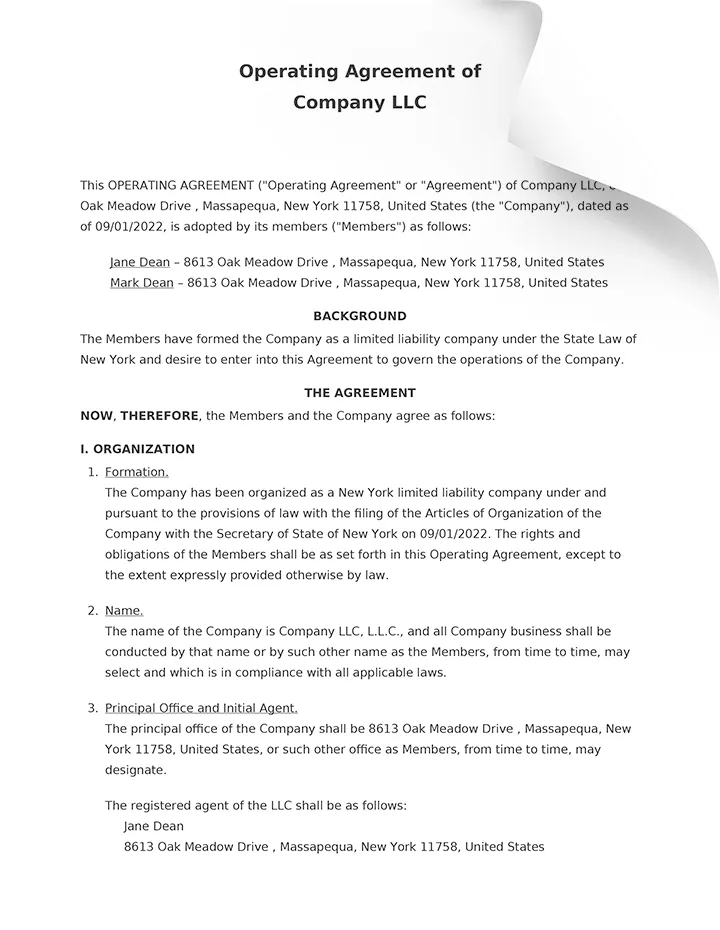What is an Operating Agreement for an LLC in New York?
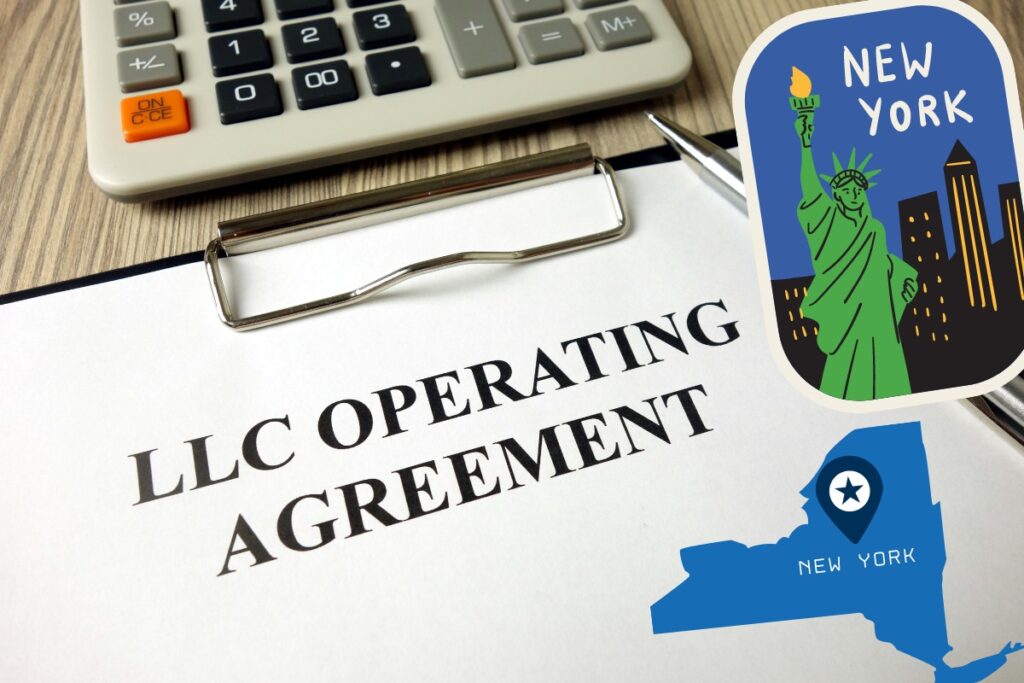
A free New York LLC Operating Agreement is an internal document that tailors the terms of a limited liability company to the unique requirements of its members.
Similar to how Articles of Incorporation structure corporations, this legal entity clearly defines financial and operational decision-making processes within the LLC. As a result, New York operating agreements are essential for the effective governance of LLCs.
Additionally, Section 206 of the Limited Liability Company Law requires most New York limited liability companies to publish their Articles of Organization or a related formation notice. This publication must appear in two newspapers for six consecutive weeks, designated by the county clerk where the LLC’s office is located. The newspapers charge fees for this service.
To avoid errors, verify that the published details match the New York State Department records exactly as listed in the initial articles of organization. After publication, obtain an affidavit of publication from each newspaper’s printer or publisher.
What are the Types of LLCs in New York?
In New York, Limited Liability Companies (LLCs) offer various structures tailored to meet the diverse needs and objectives of business owners. The state specifically recognizes the following types of LLCs:
1. Single-Member LLCs
— Owned and operated by one individual or entity, this structure provides the sole member with limited liability protection while enabling direct control over decisions and operations.
2. Multi-Member LLCs
— Owned by two or more members, these LLCs offer the same limited liability protection. However, they require detailed operating agreements to define profit distribution, losses, and management responsibilities.
3. Member-Managed LLCs
— In this structure, all members participate in daily operations and decision-making processes. Smaller LLCs often prefer this setup because members wish to stay actively involved in management.
4. Manager-Managed LLCs
— These LLCs designate one or more managers (who can be members or outsiders) to handle day-to-day operations. This setup allows other members to take a passive role. Members typically choose this option when they aim to invest in the LLC without managing operations or when the business’s complexity demands professional management.
5. Professional LLCs (PLLCs)
— Specifically designed for licensed professionals, such as doctors, lawyers, and accountants, PLLCs enable these professionals to benefit from liability protection and tax advantages while complying with state licensing requirements.
6. Foreign LLCs
— A foreign LLC refers to one formed in another state but registered to do business in New York. Registering as a foreign LLC is essential for businesses operating across state lines to comply with New York’s laws and regulations.
7. Domestic LLCs
— These are LLCs formed and registered within New York. A domestic LLC operates primarily within the state and must comply with all local filing and operating requirements.
In conclusion, selecting the right type of LLC is critical for aligning with your business objectives and maintaining compliance with New York state laws. When making this decision, consider factors such as ownership structure, desired level of control, and industry-specific needs.
Why is an LLC Operating Agreement Important in New York?
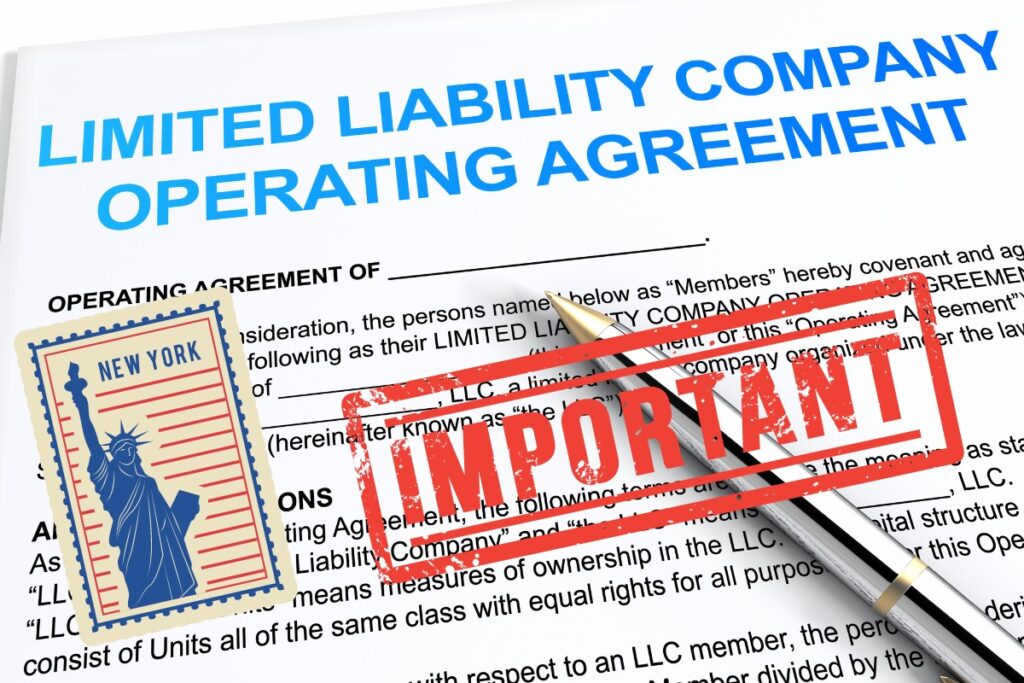
New York LLC owners or members enter into LLC agreements to formalize their private arrangements and supplement the default regulations rules in applicable NY LLC laws. (Operating Agreement State Law)
As per the legal provisions outlined in NY LLC L § 417 (2019), New York LLC members are mandated to adopt a written LLC Operating Agreement Template New York before, at the time of, or within ninety days after filing the New York LLC Articles of Organization.
Is an operating agreement required in New York?
Yes. Under statute NY LLC L § 1102 (2019), you are required to retain a copy of your New York Operating Agreement LLC template and any subsequent amendments.
Furthermore, an LLC operating agreement has the following benefits:
- It emphasizes the company’s distinct entity, which protects the members from the liabilities of the LLC itself;
- This legal document describes how profit is allocated and distributed;
- It provides clarity in the company’s management structure which is vital for effective leadership and strategic planning;
- It cements the LLC’s legitimacy and provides for its lawful business purpose.
- In cases of conflicts or potential ones, the LLC Operating Agreement Template New York has a vital role to play in resolving or preventing such;
- Once signed, it acts as a binding contract between the members of the LLC, and between the members and the LLC.
How do you Create an Operating Agreement for an New York LLC?
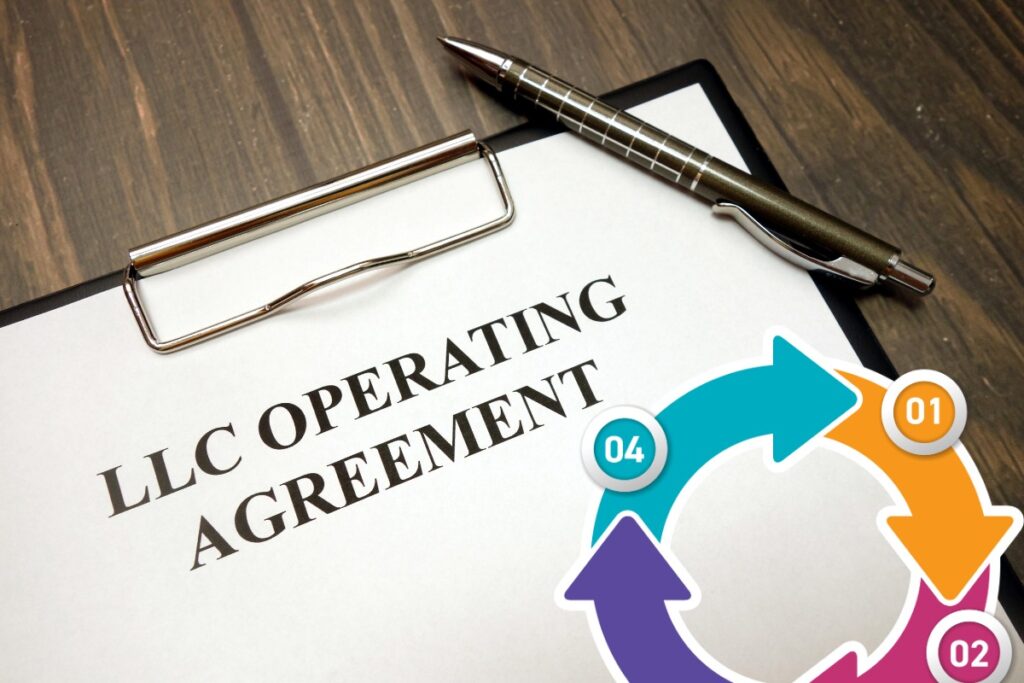
Creating a free New York LLC Operating Agreement involves careful planning to ensure clarity in management, financial structure, and member responsibilities. Follow these steps to draft a comprehensive agreement:
1) Determine the LLC Type:
Decide whether your LLC will be a single-member or multi-member entity and whether it will be member-managed or manager-managed. This decision forms the foundation of your Operating Agreement LLC Template.
2) Outline Ownership Percentages:
Define each member’s ownership interest, particularly in multi-member LLCs. Typically, ownership is based on capital contributions or an agreed-upon percentage.
3) Define Management Structure:
Specify who will manage the LLC—whether all members will participate (member-managed) or if designated managers will oversee operations (manager-managed). Outline decision-making authority and responsibilities.
4) Detail Financial Arrangements:
Explain how profits and losses will be allocated among members. Clearly define the timing and method of distributions to prevent future disputes.
5) Set Conditions for Adding or Removing Members:
Establish rules for admitting new members, transferring ownership, and handling the departure, expulsion, or death of a member. Include buyout provisions to ensure smooth transitions.
6) Establish Voting Rights and Decision-Making Processes:
Determine voting procedures, whether based on ownership percentages or equal votes per member. Specify which decisions require a majority, supermajority, or unanimous vote.
7) Plan for Dissolution:
Define the process for dissolving the LLC, distributing remaining assets, and settling debts. Having a clear dissolution plan helps avoid legal complications if the business closes.
8) Include Industry-Specific Provisions:
If your business operates in a regulated industry, include provisions that comply with applicable state and federal laws to ensure compliance.
9) Comply with New York’s Publication Requirement:
New York requires LLCs to publish a notice of formation in two newspapers. While this is separate from the operating agreement, acknowledging this requirement in your agreement ensures compliance.
10) Review by Legal Counsel:
Although New York does not require LLCs to file their operating agreement with the state, consulting an attorney ensures that the agreement is legally sound and tailored to your business needs.
Remember, an operating agreement is a crucial internal document that protects the interests of members and provides legal clarity. Keep a signed copy with your business records and make it accessible to all LLC members.
How to Amend an LLC Operating Agreement in New York?
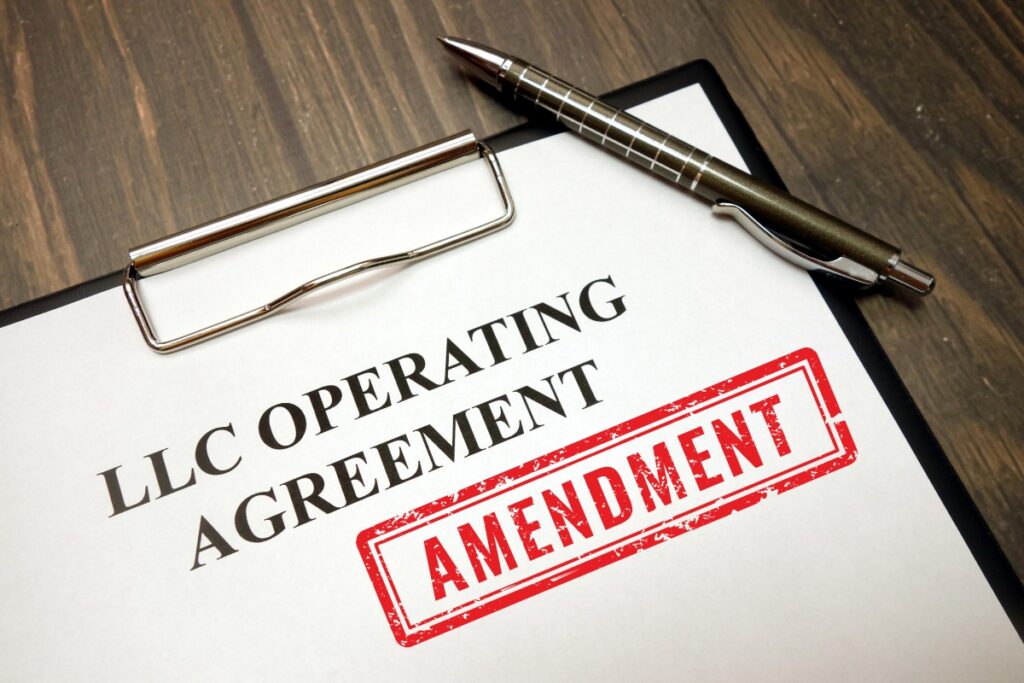
In New York, amending an LLC operating agreement template is a straightforward process governed by the state’s laws and regulations. Changes can be made by all the members through a formal amendment procedure outlined in the LLC Operating Agreement New York.
The reasons for amendment may include updates to the management structure, member contributions, or any other provisions initially outlined.
This flexibility ensures that LLC owners can adjust their operating agreements to reflect business operations or ownership structure changes.
How will the New York LLC be Treated for US Federal Income Tax Purposes?
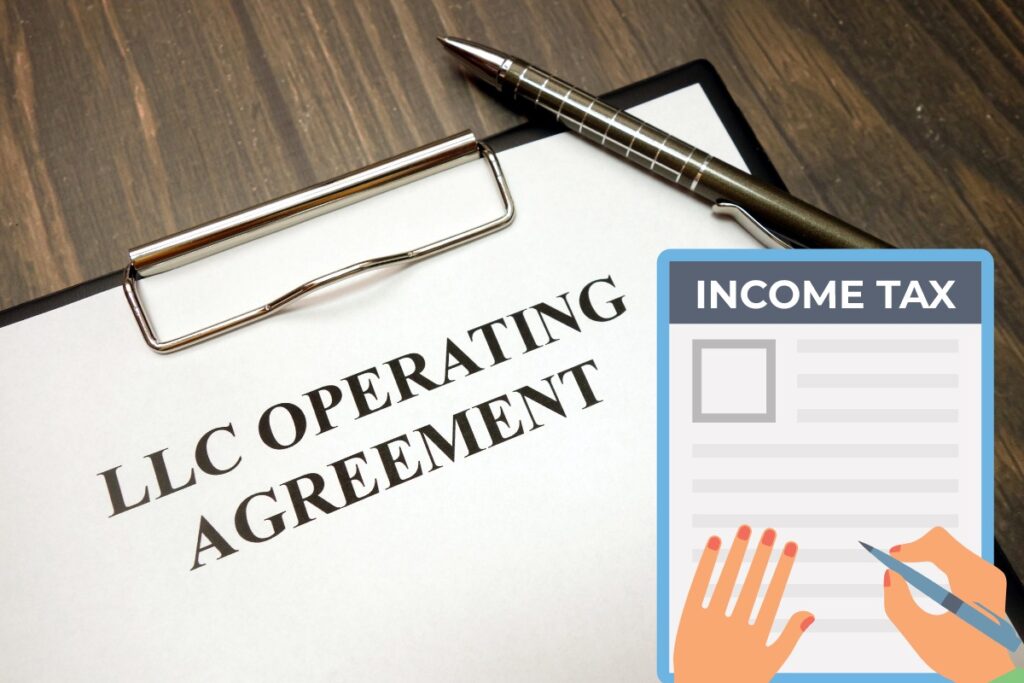
The IRS determines the income tax treatment of an LLC based on its number of members and the tax classification election elections made by the LLC.
- Single-Member LLC: By default, a single-member LLC is not considered separate. The income and expenses of both the LLC and the person are regarded as one.
- Multi-Member LLC: By default, a multi-member LLC is treated as a partnership for federal income tax purposes.
- Election to be Taxed as a Corporation: An LLC, whether single-member or multi-member, can elect to be taxed as a C corporation by filing Form 8832 (Entity Classification Election) with the IRS.
These options provide flexibility for LLC owners to choose the tax treatment that best suits their financial and operational needs.
How will the New York LLC Deal with Dissolution?

The dissolution of an LLC in New York is primarily governed by Section 7 of the New York LLC Company Law. This is primarily divided into three parts: (a) Dissolution, (b) Winding Up, and (c) Filing Requirements.
- (a) Dissolution – dissolution may be voluntary or judicial (involuntary). A voluntary dissolution is done by the vote or consent of the majority of the members or by a different percentage specified in the operating agreement. A judicial dissolution is one that is done following a court order under certain circumstances. It is commenced by an application of a member and upon finding by the court that it is no longer reasonably practicable to carry on the business in conformity with the articles of organization or operating agreement.
- (b) Winding Up – members may wind up the LLC’s affairs upon voluntary dissolution. The persons winding up the LLC may prosecute and defend suits, settle the business, dispose of the property , and distribute the remaining assets of the LLC.
- (c) Filing Requirements – To finalize the dissolution, the LLC must file Articles of Dissolution with the New York Department of State. This filing officially terminates the LLC’s legal existence and ensures compliance with state requirements. Additionally, the LLC must settle any outstanding taxes and obligations before filing.
Why Should You Use FormPros’ New York LLC Operating Agreement Generator?
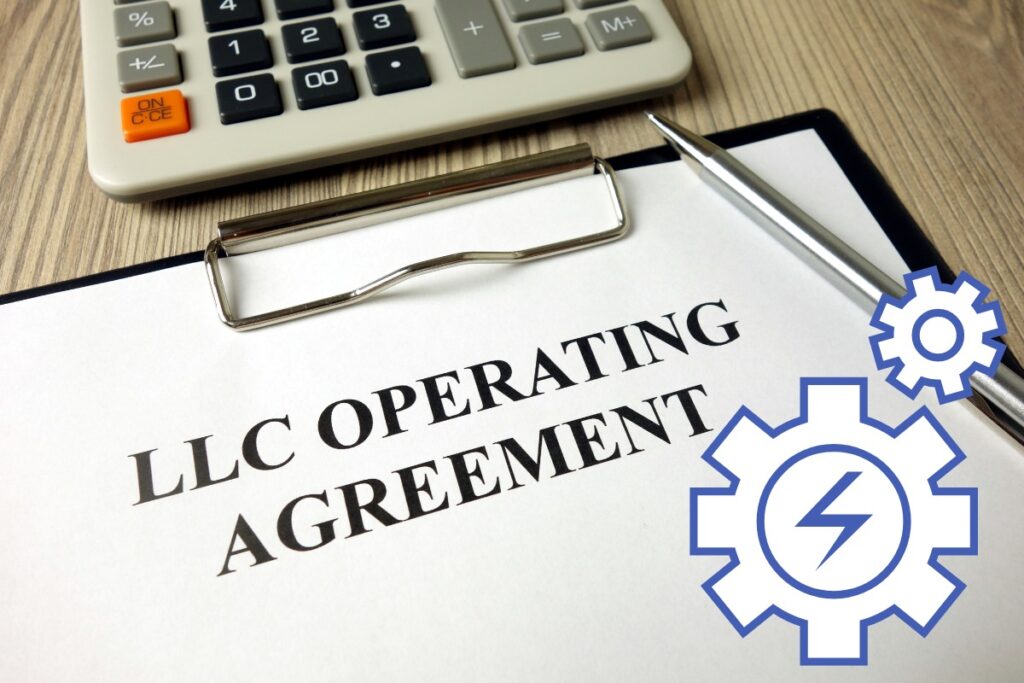
A free New York LLC Operating Agreement Generator offers several benefits for business owners looking to streamline the process. Here’s why it’s a valuable tool:
1. Customization –
The generator creates an operating agreement tailored to your LLC’s specific needs, ensuring that essential business aspects are covered.
2. Legal Compliance –
The tool ensures the document aligns with New York LLC laws, helping you meet state requirements and avoid compliance issues.
3. Time and Cost Efficiency –
By automating the drafting process, the generator provides a cost-effective alternative to hiring an attorney while saving time.
4. Simplicity and Accessibility –
Designed for ease of use, the generator walks you through each step, making it accessible even if you don’t have legal experience.
5. Protection for Members –
The generated operating agreement clearly defines member roles, responsibilities, and profit-sharing arrangements, reducing the risk of disputes.
6. Comprehensive Documentation –
Using the generator helps you maintain a well-structured, professional document that serves as a critical record of your LLC’s operational framework.
With FormPros, you can create a customized, legally sound New York LLC Operating Agreement template quickly and efficiently, ensuring your business is structured for long-term success.
Create A New York LLC Operating Agreement Now
State Specific LLC Operating Agreements
- Alabama
- Alaska
- Arizona
- Arkansas
- California
- Colorado
- Connecticut
- Delaware
- Florida
- Georgia
- Hawaii
- Idaho
- Illinois
- Indiana
- Iowa
- Kansas
- Kentucky
- Louisiana
- Maine
- Maryland
- Massachusetts
- Michigan
- Minnesota
- Mississippi
- Missouri
- Montana
- Nebraska
- Nevada
- New Hampshire
- New Jersey
- New Mexico
- New York
- North Carolina
- North Dakota
- Ohio
- Oklahoma
- Oregon
- Pennsylvania
- Rhode Island
- South Carolina
- South Dakota
- Tennessee
- Texas
- Utah
- Vermont
- Virginia
- Washington
- West Virginia
- Wisconsin
- Wyoming
New York LLC Operating Agreement FAQs
-
Can I create an operating agreement after forming my New York LLC?
Yes, you can create an operating agreement after forming your New York LLC. However, it's advisable to have one in place as soon as possible to clarify the rights and responsibilities of members and managers, as well as other important aspects of your LLC's operation. You can draft the operating agreement yourself or seek assistance from legal professionals familiar with New York LLC regulations. Once drafted, ensure it complies with the requirements set forth by the New York Department of State for LLC operating agreements.
-
Are there any specific requirements (or non-requirements) for the contents of an LLC operating agreement in New York?
- The NY LLCL does not require officers;
- The New York Transparency Act requires certain LLCs to disclose beneficial ownership information to the New York State Department (DOS);
- The admission of new members requires a vote of a majority in the interest of the members entitled to vote (NY LLCL §§ 402(c)(1) and 203(e)(7));
- A manager is not required to be a member unless the operating agreement provides otherwise (NY LLCL § 410(a));
- The vote or written consent of the members having at least the majority in interest is required to terminate the LLC, unless the operating agreement requires otherwise. (NY LLCL § 701(a)(3).)
Operating agreements are intricate legal documents, so it's understandable that many new LLC proprietors may not possess the expertise to craft one independently. This is precisely why FormPros provides complimentary, lawyer-prepared operating agreement templates, tailored to specific states like New York and easily adaptable to suit the requirements of your LLC.
-
Can an LLC operating agreement be amended multiple times in New York?
Yes, it may be amended from time to time as provided therein. However, no amendment shall be made that:
(a) increases the obligations of any member to make contributions;
(b) alters the allocation of any items of income, gain, loss, or deduction or credit for tax purposes;
(c) alters the manner of computing the distributions of any member;
(d) allows the obligation of a member to make a contribution to be compromised by consent of less than all the members. -
What happens if my New York LLC does not have an operating agreement?
Members LLC Operating Agreement Generator>should adopt a written operating agreement. Without this agreement, this will lead to the application of New York Laws on LLC, potentially complicating matters further for your LLC. Without an operating agreement in place, business owners and their co-owners may find themselves ill-prepared to resolve disputes regarding management and finances.
-
Can an LLC operating agreement outline the roles and responsibilities of members and managers in New York?
Yes. If manager-managed, management of the company will follow after chapter 34 of the New York LLC Law, the articles of organization of the company, and section 418 of NY LLC Law or that which provides for the classes and voting powers of members.
If managed by members, such member(s) shall be deemed as the manager for purposes of applying the provisions of Chapter 34 (Management of Members or Managers), unless the context otherwise requires, and (ii) any such member shall have and be subject to all of the duties and liabilities of a manager in the said chapter.
-
Does New York require an LLC operating agreement to be notarized?
No. New York state law does not require LLC operating agreements to be notarized. However, it's important to note that while notarization is not mandatory, having your LLC operating agreement notarized can add an extra layer of authenticity and legal recognition to the document.
-
Can an LLC operating agreement cover dispute resolution among members in New York?
Yes. Section 417 of the New York LLC provides significant flexibility for LLCs to customize their operating agreements to suit the members' needs. This includes provisions on how to resolve disputes in case they arise. Here are some key points regarding dispute resolution in an LLC operating agreement in New York:
- Flexibility: Allowing members to tailor the dispute resolution process to the specific needs and circumstances of the LLC;
- Arbitration or Mediation: These are private and often more efficient means of resolving disputes compared to traditional litigation;
- Procedures: The operating agreement can outline detailed procedures for initiating, conducting, and concluding the dispute resolution process. This may include requirements for notice, negotiation, mediation sessions, selection of arbitrators or mediators, and the timeline for resolution.
-
Can I use a template to create my New York LLC operating agreement?
Yes, an LLC operating template can be because the NY LLC law grants members flexibility. Also, operating agreements are subject to general contract law principles which means that parties can agree to whatever stipulations as long as they are not contrary to state law, morals, and public policy.
-
Can an LLC operating agreement deal with allocating profits and losses among members in New York?
Yes, an LLC operating agreement in New York can address the allocation of profits and losses among members, typically by specifying how they will be distributed based on ownership percentages, roles, or initial capital contributions.
-
How does an LLC operating agreement protect members' personal assets in New York?
It primarily protects the personal assets of members and managers by establishing the LLC as a separate legal entity. This separation ensures that members are not personally liable for the company's debts or legal liabilities beyond their investment in the LLC. (§609)
-
Can an operating agreement address the procedures for admitting new members to the LLC in New York?
Yes, because of the flexibility provided by Section 417, members can specify the procedure for admitting new members. In the absence thereof, NY LLC Law provides for dates of effectivity of membership and the admission process after such date of effectivity. (§602)
-
Are any specific clauses required in a New York LLC operating agreement for multi-member LLCs?
While New York doesn't have specific required clauses, multi-member LLC operating agreements often include provisions related to LLC organization, equity infusions and accounts, member admission, withdrawal, certification, income and loss allocation, tax allocations, cash distributions, and company management.
-
Can an operating agreement specify voting rights and decision-making processes for the LLC in New York?
Yes. Section 402 provides that operating agreements may grant members the right to vote on the same matters as authorized under the NY LLCL, such as voting on significant matters such as the sale of all or substantially all the LLC's assets, dissolution, merger, or consolidation of the LLC.
-
Can an LLC operating agreement in New York include non-compete clauses?
The New York Limited Liability Company Law does not explicitly address non-compete clauses in operating agreements in a specific section. Instead, the allowance for including non-compete clauses is generally derived from the broad authority under Section 417 for members to craft operating agreements. And since non-compete clauses are subject to general contract law principles, they must be provided so they do not violate the law or public policy.
-
How does an operating agreement help maintain limited liability protection for members of an LLC in New York?
Section 609 (Liability of Members) clarifies that members, managers, or agents are not liable for any debts, obligations, or liabilities of the LLC or each other, whether arising in tort, contract, or otherwise, solely because they are such members, managers, or agents in the conduct of the LLC business. This clear delineation or separation is often called the "piercing of the corporate veil." To support the principle of Limited Liability, the operating agreement may provide:
- Segregation of Assets and Operations - detail the procedures for capital contribution, distributions, and handling of company funds, among others;
- Governance and Decision-Making Process - clear rules on who has the decision-making authority, the roles of members and managers, and the resolution of disputes help reinforce the existence of a distinct legal unit;
- Member Roles and Responsibilities - a clear definition of roles and obligations helps clarify the course of action to conduct the LLC business;
- Dissolution and Winding Up - the dissolution process and distribution of assets upon winding up can help ensure that the closer of the business respects the separate existence of the company obligations and member assets.
-
What is the role of the Commercial Licensing Bureau?
It typically refers to state or local government agencies in various jurisdictions that are responsible for issuing licenses and permits for specific types of businesses or commercial activities. In New York, the primary state agency responsible for overseeing, filing, and administrating LLCs is the New York State Department of State, Division of Corporations. This Division handles the filing of organizational documents for new LLCs, such as Articles of Organization, and ensures compliance with the New York Limited Liability Company Law (NYLLCL).
-
Who can serve as a Registered Agent for my New York LLC?
Each domestic or authorized foreign LLC may designate a registered agent upon whom process against the LLC may be served. (Section 302) When this is done, LLCs are also required to provide an address for forwarding any service or process. In addition, the Secretary of State shall be the agent of every domestic and foreign LLC. (Section 301)
Section 302 (Service of process on the Secretary of State as an agent of a limited liability company): Outlines the procedure for serving process on the Secretary of State as the agent of the LLC. This includes providing the LLC a copy of the process at its address on file through certified mail.
-
Can a legal business entity act as a member of a New York LLC?
Yes, a "member" means a person who has been admitted as a member of an LLC following the terms and provisions of the LLC Law. A "person" means any association, corporation, limited partnership, or any other individual or entity in its own or any representative capacity. (Section 102)
-
What is the filing fee for an LLC Operating Agreement in New York?
There is no filing fee for an operating agreement because it is not filed with the Department of State or any other governmental agency. The Operating Agreement is an in-house record kept by the LLC members and may need to be presented to financial institutions for tax purposes or in legal situations. However, other documents require the payment of filing fees, such as the Articles of Organization, which cost $200.
-
How does the Internal Revenue Service (IRS) classify an LLC in New York for tax purposes?
The IRS has a uniform classification system for LLCs for federal tax purposes. This classification applies regardless of the state in which the LLC is organized. The classification depends on the number of members in the LLC. These are:
- Single-Member LLCs - these are not considered a separate entity for tax purposes. This means the LLC does not pay taxes or file a separate return. The income and deductions are reported on the owner's tax return;
- Multi-Member LLC - this is classified as a partnership for federal tax purposes. This means that a multi-member LLC is a pass-through entity for tax purposes. The LLC must file an information return using Form 1065, and each member reports their share of the LLC's income or loss on their tax returns using Schedule K-1 (Form 1065);
- Electing Corporate Taxation: An LLC can be taxed as a corporation by filing Form 8832 (Entity Classification Election) with the IRS. After making this election, the LLC can be taxed as either a C corporation or an S corporation (if it is eligible as an S corporation) by filing Form 2553.
-
Do I need to file my New York LLC Operating Agreement with the state?
No, there is no requirement under the New York LLC Law that operating agreements be filed with the state. The Operating Agreement is an in-house record whose details are kept among members and are not submitted to the state as part of the state's records.





